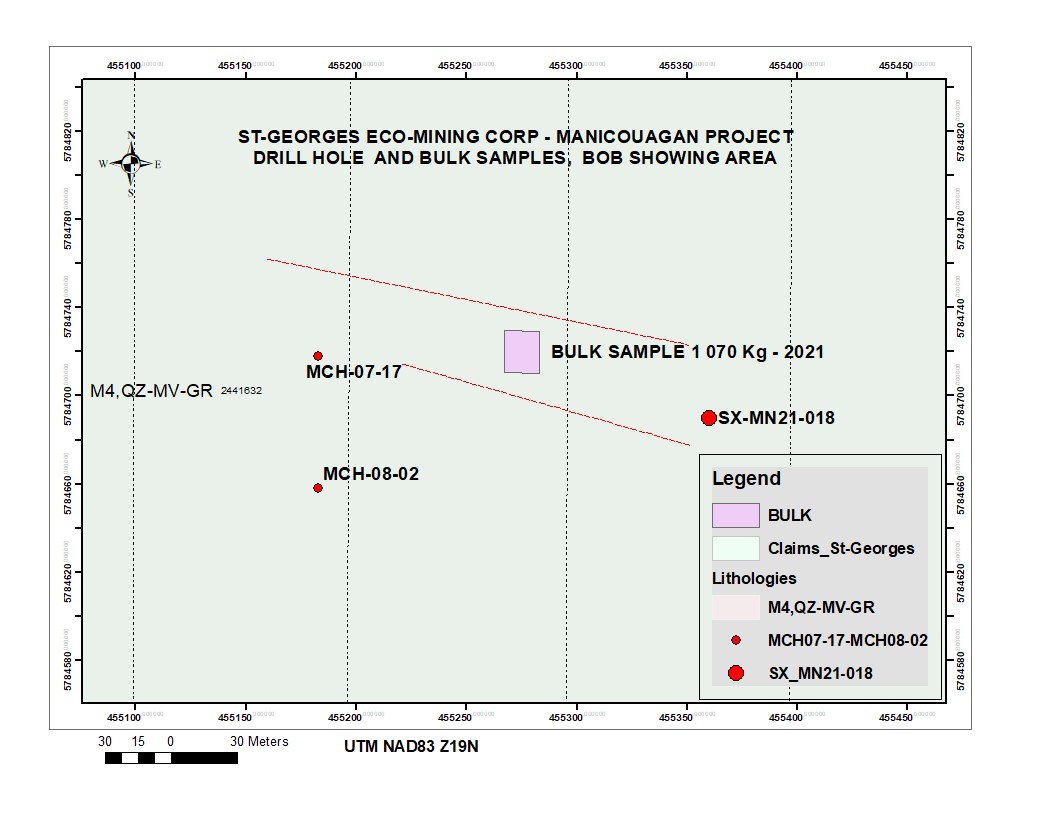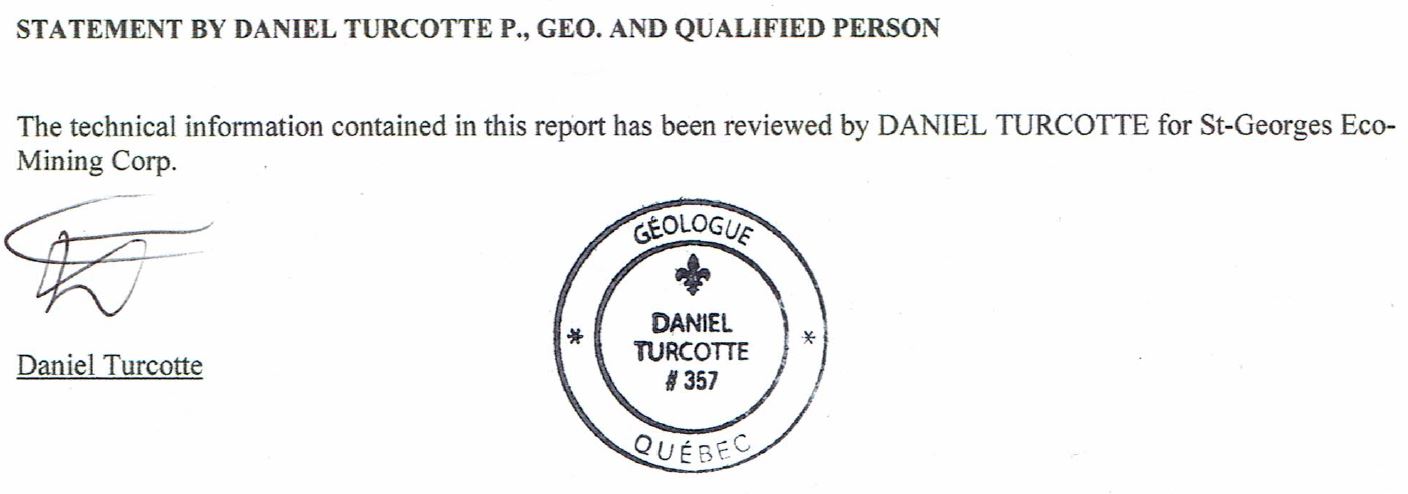St-Georges Eco-Mining Corp. Manicouagan Critical Metals Drilling Update: High-Grade Rhodium
posted on
Apr 07, 2022 08:11AM


St-Georges Eco-Mining Corp. (CSE:SX)(OTCQB:SXOOF)(FSE:85G1) is pleased to release the additional partial results of its 2021 drilling campaign on its 100% own Manicouagan Project.
The drill cores sampled return results up to 0.84 g/t of rhodium, 1.3 g/t ruthenium, 0.16 g/t osmium and 0.3 g/t iridium over 0.5 meters.
Eight separate samples were selected for re-assay for all Platinum Group Elements (PGE) from hole 21-18. The additional average results over the 2-meter zone previously released on March 25, 2022 (from 47.5 meters to 49.5 meters) include 0.55 g/t rhodium, 1.087 g/t ruthenium, 0.214 g/t iridium and 0.11 g/t osmium. The Company believes these are significant credits to the reported 2-meter section intersected in hole 2021-18. These results coincide with the random samples collected from the bulk sampling and attests to the vertical extent of nickel-copper-cobalt and PGE's present in this system. Therefore, the Company intends to accelerate its metallurgical sampling program to determine the viability of economically separating and recovering the various suites of minerals identified in the Manicouagan massive sulfide discovery.
The samples were shipped from Val D'or ALS Laboratories to Bureau Veritas for a complete suite of assays. The eight samples were selected from the better values reported previously from ALS and reported in the Company's last press release on March 24, 2022 (Discovery of High-Grade Nickel & Palladium Corridor Confirmed). Therefore, the samples are not sequential throughout the previous reference to 6.5 meters but are sequential through the 2-meter section previously announced. The Best 2-meter results for platinum and palladium are reported in a side-by-side comparison in Table 1, along with additional results for iridium, osmium, rhodium and ruthenium.

Table 1 - Assay results for a 2-meter section of 2021-Hole 18
Comparatively, assay results for platinum and palladium were similar in nature. Several of the higher-grade samples for platinum and palladium showed decreases from the previous 2-meter results reported in the last press release. This reduced the platinum values by 8% and the palladium values by 18%, as shown in Table 1 above. These variations may be attributable to either or both of the different processes used to establish the assay values and/or the inconsistencies of mineral content in the sample. In fact, the highest iron content (massive sulfides +25% to >50%) is present within this 2-meter zone and may have contributed to any processing issues present.
Table 2 is a reminder of the representative samples collected from the 1,070 kg bulk sample. These values confirm the association and relative consistencies of PGE minerals at surface and at depth.

Table 2 - Representative samples collected from the 1,070kg bulk sample
Hole 21-18 was drilled to the southeast of the historical Bob Showing, where a 1,070 kg bulk sample was collected this year (See St-Georges Press Release from February 10, 2022: https://webfiles.thecse.com/SX_Press_Release_-_February_10_2022_-_Manic_Bulk_Sample_Material_Contains_Suite_of_Platinum_Group_Metals_Between_2.36_2.92_Nickel.pdf?bCt6DsKbhE6dQV.V4r3Kl3FsUD2ISD15
The map below (Map 1.) shows the location of the hole 21-18 in relation to the bulk sample and two historical holes, 07-17 and 08-02. Two minor faults are reported in the vicinity of these holes.

Map 1 - Location of hole 21-18 in relation to 2021 bulk sampling and two historical holes nearby.
Table 3 provides the entire results for the eight samples submitted for secondary assay of the suite of PGEs.

Table 3 - Results for the eight samples submitted for secondary assay
The Company has a large quantity of samples in the process of being assayed by its independent labs. St-Georges' contracted geologists are still hard at work processing the last batch of core that came out of the Manicouagan Project's camp earlier this month. Assays results will be disclosed as they become available.
Because of the high-grade assays returned and the identification of a mineralized trend or corridor, the Company expanded its claim position in the area to maintain its competitive advantage. This year, the Company expects to conduct a cursory exploration program on the new land acquisition with some geophysics, geologic mapping, and geochemical sampling of surface outcrops.
"We believe we are refining our knowledge of structure and mineralization at our Manicouagan project. Previously overlooked and, in some cases, unknown mineralization and trace element geochemistry provide additional targets that both extend the known areas and provide additional targets that remain untested. This particularly involves the distribution of PGEs. Hole 21-18 provided a 2-meter-thick zone that, when you add all of the metals together, gives us 7% nickel equivalent. Historic holes intersected narrow zones (0.22m) that had a combined value of over 12.5% nickel equivalent at today's quoted prices.
"Palladium, rhodium, ruthenium, and platinum are significantly enriched in areas where higher-grade nickel-cobalt-copper sulfides exist. Historically, these minerals were overlooked or, at best, cursorily sampled for all PGEs. Even so, the results from historic drilling include values to 1.73 g/t rhodium and 2.7 g/t ruthenium. More importantly, for our future exploration programs, we find that the various PGEs do not go hand-in-hand but can exist separately and more widely spread from the highest concentrations of base metals. This means higher grades of rhodium and other PGEs may exist within the 16 historic holes that encountered 0.7-to-7-meter widths of high-grade nickel-copper-cobalt within the Bob and Bob East zones. This is also true for elsewhere on this large property position.
"(…) We hope to benefit from this knowledge, especially in the case of the platinum-palladium-rhodium (PGE) mineralization which appears to have been under-explored in this region. St-Georges hopes to take this knowledge to the next level by also utilizing the new pathfinder elements developed during the 2021 drill program. (…)" commented Herb Duerr, CEO & President of St Georges Eco-Mining.
About Rhodium Metal
Rhodium is one of the rarest and most valuable precious metals in the world, currently valued at US$19,000 per ounce or $610 per gram. It is only found in platinum or nickel ores that tend to run with the other members of the platinum group metals. Currently, South Africa produces roughly 80% of the global supply, while Russia and North America account for the bulk of the remaining 20%.
The global market for rhodium is around 1.2 million ounces and with supply running a multi-year deficit, the value of the metal has grown steadily since 2017. The reason for this being that rhodium is only produced as a co- or by-product with average grades of up to .5 g/t. In fact, many producers of rhodium today are operating at much lower grades, making St-Georges' discovery very significant in terms of grades being reported.

ON BEHALF OF THE BOARD OF DIRECTORS
"Herb Duerr"
HERB DUERR
President & CEO
About St-Georges Eco-Mining Corp.
St-Georges develops new technologies to solve some of the most common environmental problems in the mining sector, including maximizing metal recovery and full circle EV battery recycling. The Company explores for nickel & PGEs on the Julie Nickel Project and the Manicougan Palladium Project on Quebec's North Shore and has multiple exploration projects in Iceland, including the Thor Gold Project.